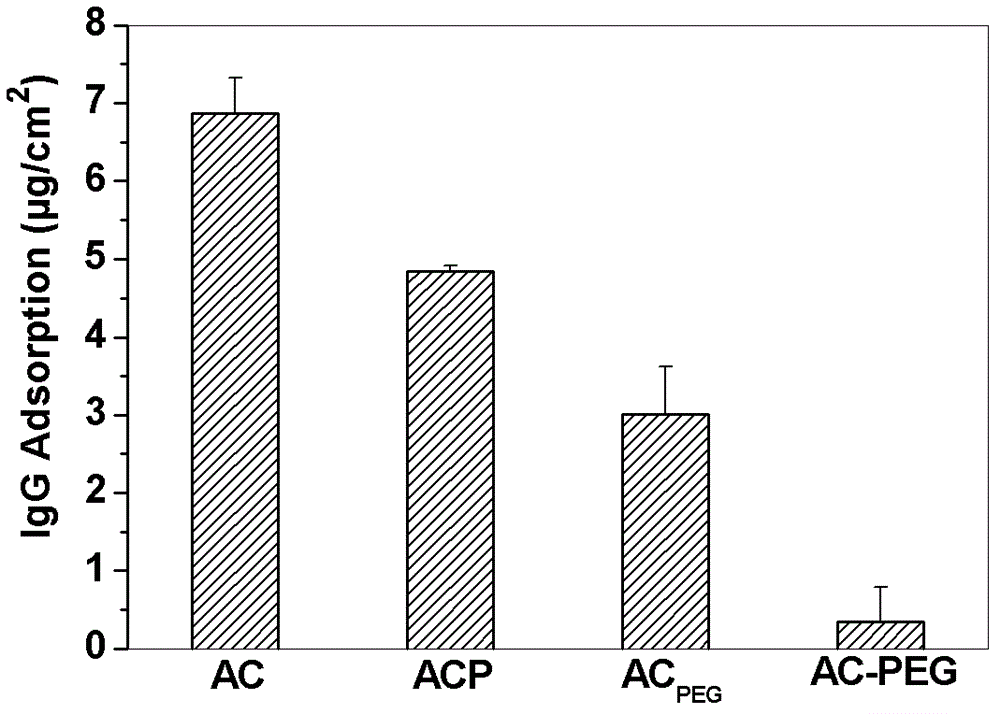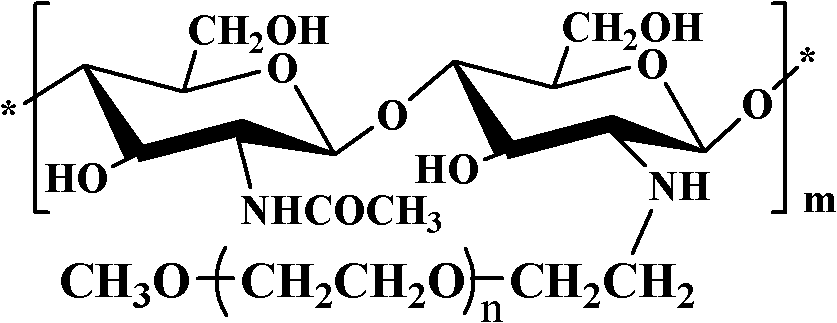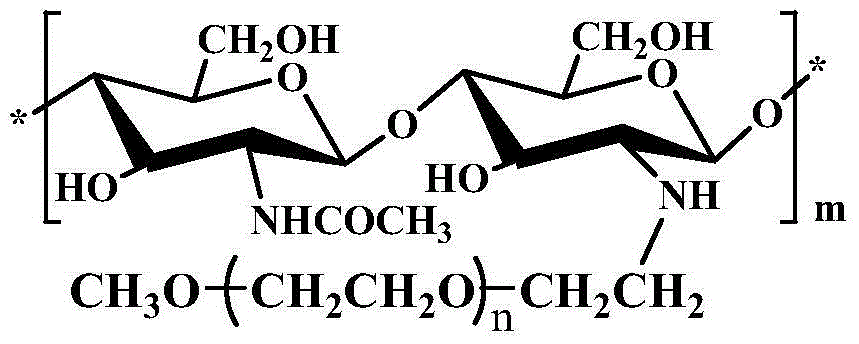Alginate-chitosan microcapsules modified by peg grafting and its preparation and application
A technology of chitosan microcapsules and alginate, which is applied in the direction of microcapsule preparation, microsphere preparation, immobilization on/in organic carriers, etc., which can solve the problems of protein adsorption, large surface roughness and surface charge, etc. , to achieve the effect of improving stability, avoiding tediousness, and good biocompatibility
- Summary
- Abstract
- Description
- Claims
- Application Information
AI Technical Summary
Problems solved by technology
Method used
Image
Examples
Embodiment 1
[0037] 1) Terminal aldylation of PEG: The molecular weight of PEG is 500 Da. The terminal hydroxyl group of PEG is oxidized into aldehyde group by oxidation method to prepare PEG-CHO. The PEG-CHO is dissolved in normal saline at a concentration of 10 g / L.
[0038] 2) Preparation of chitosan solution: chitosan molecular weight 20kDa, deacetylation degree 90%, dissolved in sodium acetate / acetic acid buffer solution with pH 6.5, concentration 10g / L.
[0039] 3) Preparation of AC microcapsules: immerse calcium alginate gel beads prepared by high-voltage electrostatic method into chitosan solution, the volume ratio of microspheres and chitosan solution is 1:40, react for 20 minutes, wash with normal saline, and prepare AC microcapsules.
[0040] 4) Immerse the AC microcapsules in the PEG-CHO solution, drop the reducing agent sodium triacetoxyborohydride solution, the concentration of sodium triacetoxyborohydride is 0.1g / L, the microspheres, PEG-CHO and triacetoxy The volume ratio ...
Embodiment 2
[0057] 1) Terminal aldylation of PEG: The molecular weight of PEG is 2 kDa, and the hydroxyl group at the end of PEG is oxidized to form an aldehyde group by an oxidation method to prepare PEG-CHO. The PEG-CHO is dissolved in normal saline at a concentration of 5 g / L.
[0058] 2) Preparation of chitosan solution: chitosan molecular weight 60kDa, deacetylation degree 90%, dissolved in sodium acetate / acetic acid buffer solution of pH 6.5, concentration 5g / L, the solution is represented by C.
[0059] 3) Immerse the calcium alginate gel microspheres embedded with porcine islet cells in the chitosan solution prepared in step 2), the volume ratio of the microspheres to the chitosan solution is 1:10, react for 20 minutes, and wash with normal saline , prepared into AC microcapsules.
[0060] 4) Immerse the AC microcapsules prepared in step 3) into the PEG-CHO solution prepared in step 1), add dropwise the reducing agent sodium cyanoborohydride solution, the concentration of sodium c...
Embodiment 3
[0064] 1) Terminal aldylation of PEG: The molecular weight of PEG is 10kDa, and the hydroxyl group at the end of PEG is oxidized into aldehyde group by oxidation method to prepare PEG-CHO, which is dissolved in normal saline at a concentration of 5g / L.
[0065] 2) Preparation of chitosan solution: chitosan molecular weight 100kDa, deacetylation degree 90%, dissolved in sodium acetate / acetic acid buffer solution of pH 6.5, concentration 5g / L, solution is represented by C.
[0066] 3) Immerse the calcium alginate gel microspheres embedded with porcine hepatocytes in the chitosan solution prepared in step 2), the volume ratio of the microspheres to the chitosan solution is 1:10, react for 10 minutes, and wash with normal saline , prepared into AC microcapsules.
[0067] 4) Immerse the AC microcapsules prepared in step 3) into a 1.5 g / L sodium alginate solution, react for 10 minutes, wash with physiological saline, and prepare ACA microcapsules.
[0068] 5) Repeat step 3) to prep...
PUM
| Property | Measurement | Unit |
|---|---|---|
| particle diameter | aaaaa | aaaaa |
| thickness | aaaaa | aaaaa |
| molecular weight | aaaaa | aaaaa |
Abstract
Description
Claims
Application Information
 Login to View More
Login to View More - R&D
- Intellectual Property
- Life Sciences
- Materials
- Tech Scout
- Unparalleled Data Quality
- Higher Quality Content
- 60% Fewer Hallucinations
Browse by: Latest US Patents, China's latest patents, Technical Efficacy Thesaurus, Application Domain, Technology Topic, Popular Technical Reports.
© 2025 PatSnap. All rights reserved.Legal|Privacy policy|Modern Slavery Act Transparency Statement|Sitemap|About US| Contact US: help@patsnap.com



